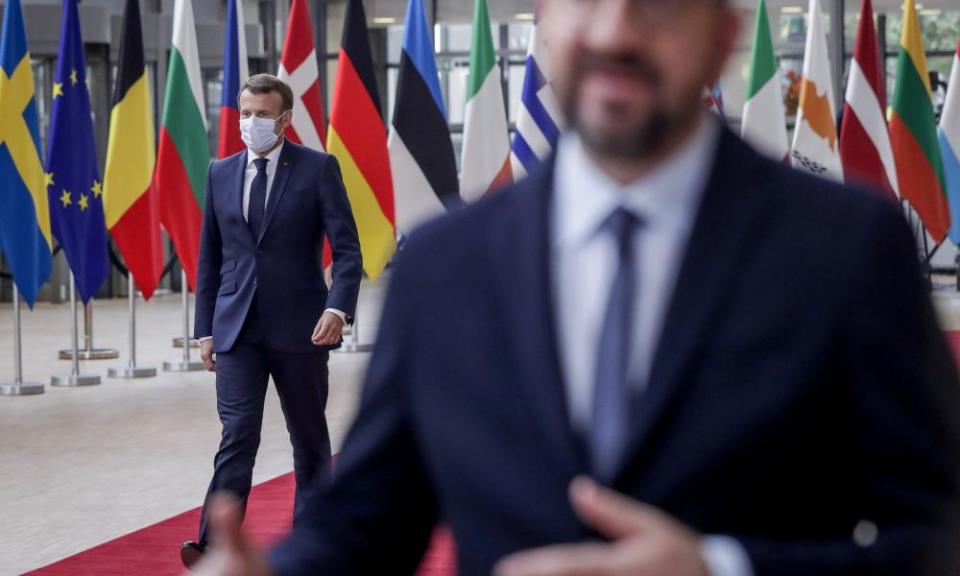Brexit: No 10 startled by EU insistence that UK accept trade terms

Downing Street reacted in dismay as Emmanuel Macron led EU leaders in warning Boris Johnson that he must swallow the bloc’s conditions, in what appeared to be taken as a direct challenge to the British prime minister’s threat to walk out on the talks.
At a summit in Brussels, the EU proposed a further “two to three weeks” of negotiations but Europe’s heads of state and government offered Johnson little succour, demanding that he alone needed to “make the necessary moves to make an agreement possible”.
Related: EU deal still possible, PM to be told, as potential fisheries plan emerges
The intervention was evidently regarded as incendiary in No 10 as Johnson had said he would make a decision on Friday on whether there were grounds to continue the talks. In September, he had said that without agreement by the time of this summit the government would “move on” to focus on no-deal preparations.
The summit communique issued on Thursday afternoon noted the lack of progress but asked the EU’s chief negotiator, Michel Barnier, to “continue negotiations in the coming weeks”. To the frustration of Downing Street, a call for an “intensification” of talks, included in an earlier draft of the statement, was deleted by the time leaders signed it off.
Watch: What is a no-deal Brexit?
The UK’s chief negotiator, David Frost, tweeted in response: “Disappointed by the [summit] conclusions on UK/EU negotiations. Surprised EU is no longer committed to working ‘intensively’ to reach a future partnership as agreed with [the European commission president, Ursula von der Leyen] on 3 October.
“Also surprised by suggestion that to get an agreement all future moves must come from UK. It’s an unusual approach to conducting a negotiation.”
Downing Street had been seeking a commitment to round-the-clock talks along with work on a joint legal text. Barnier said in a post-meeting press conference that there was a prospect of a deal and he would “speed up” and continue with “intensified” talks, in what appeared to be an attempt to give Johnson a reason to continue the negotiations.
“We’re available, we shall remain available until the last possible day,” Barnier said. “The negotiations aren’t over – we want to give these negotiations every chance to be successful. I shall say to David Frost we’re prepared to speed up negotiations in the next few days.”
Barnier said he would come to London on Monday to start the new round of talks.
Frost tweeted: “Boris Johnson will set out UK reactions and approach tomorrow in the light of his statement of 7 September.”
Johnson spoke by phone with Von der Leyen on Wednesday evening, but she was forced to leave the summit early on Thursday after a person with whom she had been in contact tested positive for coronavirus.
The outstanding issues in the trade and security talks remain how to hold both sides to the deal, EU access to British fishing waters and the so-called level playing field demands, sought by Brussels to ensure neither side can undercut standards or over-subsidise parts of the economy to give its companies a competitive advantage.
Speaking at the summit, Macron, who faces an election in 2022, had said defending the interests of France’s fishing boats and coastal communities was a priority although he fell short of demanding the EU’s original position of maintaining the status quo.
Related: Brexit: Barnier mocks Johnson's 'third deadline' on talks
“Under no condition can our fishermen be sacrificed during Brexit,” Macron said. “We didn’t choose Brexit. It’s the British people’s choice. So protecting the access of our fishermen to British waters, finding a good compromise for our fishermen – and I’m talking about all European countries concerned including France – is an important point in this discussion, for us.”
France is insistent that there is no margin for negotiation over catches in the Channel, where French vessels enjoy 84% of the cod quota. It is understood that Paris is willing to be more flexible about the catches in the Celtic and Scottish seas. Losses to EU hauls there could be compensated for by eating into UK quotas in EU waters.
On level playing field provisions, the UK has agreed on non-regression from current environmental, labour and social standards but Brussels wants a “ratchet” mechanism so that this baseline develops over time.
On controlling domestic subsidies, a number of principles on how each side’s system will work are being written into the deal but there is a dispute about how prescriptive these need to be, with Brussels seeking lengthy sector-by-sector provisions.
“I want to be clear: this deal will not be made at any price,” Macron said. “If these conditions are not met, it’s possible there won’t be a deal. We are ready for that. France is ready for that. We are in the process of finalising … We are ready for a no-deal.”
The Dutch prime minister, Mark Rutte, said he remained “cautiously optimistic” that agreement would be found. But he added: “For a breakthrough, movement from UK side is really necessary.”
The German chancellor, Angela Merkel, said an agreement would not be secured at any cost. “It has to be a fair agreement from which both sides can profit,” she said.
The Irish taoiseach, Micheál Martin, said Europe could not afford a double economic hit from the coronavirus pandemic and a no-deal exit of the UK at the end of the transition period in December. “I am urging the British side to engage meaningfully with the EU’s team to accelerate progress in the period ahead.”

 Yahoo Movies
Yahoo Movies 